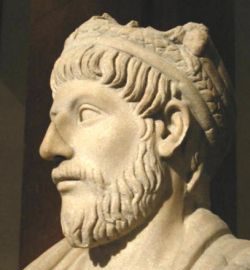Julian the Apostate ruling from 361-363 CE was an exceptional paradox in his time. He was a man of immense intelligence who returned to traditional beliefs and who wanted to modify in parallel with changing world. Although he did not like constant expand of Christianity, he did not persecute the Church and only wanted to lower his rank to one of the many cults in the Empire.
On top of everything, the emperor was the ideal of morality. He had no lover, and after the death of his wife Helena, he lived in celibacy. The silhouette of emperor Julian deviated from the vision created by Christians about dissolute and degenerate pagans.
During his short, two-year reign, the Emperor managed to carry out numerous internal reforms aimed at reducing bureaucracy and improving the efficiency of the Empire’s activities. To this end, he began to promote the project of decentralization of power. It may be assumed that if he did not died in the war with Persia, the Roman Empire could prolonge its existance.






